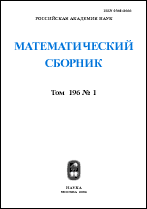|
This article is cited in 7 scientific papers (total in 7 papers)
Finite $p$-groups admitting $p$-automorphisms with few fixed points
E. I. Khukhro
Sobolev Institute of Mathematics, Siberian Branch of the Russian Academy of Sciences
Abstract:
The following theorem is proved: if a finite $p$-group $P$ admits an automorphism of order $p^k$ having exactly $p^n$ fixed points, then it contains a subgroup of $(p, k,n)$-bounded index that is solvable of $(p,k)$-bounded derived length. The proof uses Kreknin's theorem stating that a Lie ring admitting a regular (that is, without nontrivial fixed points) automorphism of finite order $m$, is solvable of $m$-bounded derived length $f(m)$. Some techniques from the theory of powerful $p$-groups are also used, especially, from a recent work of Shalev, who proved that, under the hypothesis of the theorem, the derived length of $P$ is bounded in terms of $p$, $k$, and $n$. The following general proposition is also used (this proposition is proved on the basis of Kreknin's theorem with the help of the Mal'tsev correspondence, given by the Baker–Hausdorff formula): if a nilpotent group $G$ of class $c$ admits an automorphism $\varphi$ of finite order $m$, then, for some $(c,m)$-bounded number $N=N(c,m)$, the derived subgroup $(G^N)^{(f(m))}$ is contained in the normal closure $\langle C_G(\varphi)^G\rangle$ of the centralizer $C_G(\varphi)$. The scheme of the proof of the theorem is as follows. Standard arguments show that $P$ may be assumed to be a powerful $p$-group. Next, it is proved that $P^{f(p^k)}$ is nilpotent of $(p,k,n)$-bounded class. Then the proposition is applied to $P^{f(p^k)}$. There exist explicit upper bounds for the functions from the statement of the theorem.
Received: 28.09.1992
Citation:
E. I. Khukhro, “Finite $p$-groups admitting $p$-automorphisms with few fixed points”, Russian Acad. Sci. Sb. Math., 80:2 (1995), 435–444
Linking options:
https://www.mathnet.ru/eng/sm1031https://doi.org/10.1070/SM1995v080n02ABEH003532 https://www.mathnet.ru/eng/sm/v184/i12/p53
|


| Statistics & downloads: |
| Abstract page: | 445 | | Russian version PDF: | 115 | | English version PDF: | 14 | | References: | 61 | | First page: | 1 |
|




 Contact us:
Contact us: Terms of Use
Terms of Use
 Registration to the website
Registration to the website Logotypes
Logotypes








 Citation in format
Citation in format 
